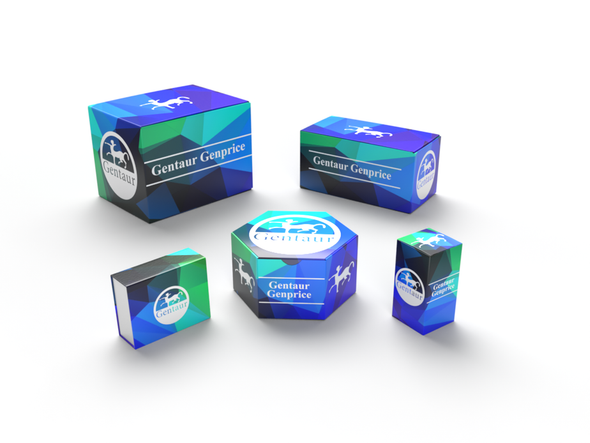Description
Rad9 Antibody | 55-891 | Gentaur UK, US & Europe Distribution
Host: Rabbit
Reactivity: Human
Homology: Predicted species reactivity based on immunogen sequence: Monkey
Immunogen: This Rad9 antibody is generated from rabbits immunized with a KLH conjugated synthetic peptide between 365-391 amino acids from human Rad9.
Research Area: Other
Tested Application: WB, IHC-P, IF
Application: For WB starting dilution is: 1:1000
For IHC-P starting dilution is: 1:10~50
For IF starting dilution is: 1:10~50
Specificiy: N/A
Positive Control 1: N/A
Positive Control 2: N/A
Positive Control 3: N/A
Positive Control 4: N/A
Positive Control 5: N/A
Positive Control 6: N/A
Molecular Weight: 43 kDa
Validation: N/A
Isoform: N/A
Purification: This antibody is purified through a protein A column, followed by peptide affinity purification.
Clonality: Polyclonal
Clone: N/A
Isotype: Rabbit Ig
Conjugate: Unconjugated
Physical State: Liquid
Buffer: Supplied in PBS with 0.09% (W/V) sodium azide.
Concentration: batch dependent
Storage Condition: Store at 4˚C for three months and -20˚C, stable for up to one year. As with all antibodies care should be taken to avoid repeated freeze thaw cycles. Antibodies should not be exposed to prolonged high temperatures.
Alternate Name: Cell cycle checkpoint control protein RAD9A, hRAD9, DNA repair exonuclease rad9 homolog A, RAD9A
User Note: Optimal dilutions for each application to be determined by the researcher.
BACKGROUND: This gene product is highly similar to Schizosaccharomyces pombe rad9, a cell cycle checkpoint protein required for cell cycle arrest and DNA damage repair in response to DNA damage. This protein is found to possess 3' to 5' exonuclease activity, which may contribute to its role in sensing and repairing DNA damage. It forms a checkpoint protein complex with RAD1 and HUS1. This complex is recruited by checkpoint protein RAD17 to the sites of DNA damage, which is thought to be important for triggering the checkpoint-signaling cascade. Use of alternative polyA sites has been noted for this gene.







![Rad9 Antibody (S387) [APR30804G] Rad9 Antibody (S387) [APR30804G]](https://cdn11.bigcommerce.com/s-1rdwiq712m/images/stencil/590x590/products/61947/62251/gentaur-genprice__26005.1661610467__29809.1661628092__75433.1661676199__77988.1661684280__64362.1661692443__28490.1661864872.png?c=1)
![Phospho-RAD9 (S277) Antibody [APR32041G] Phospho-RAD9 (S277) Antibody [APR32041G]](https://cdn11.bigcommerce.com/s-1rdwiq712m/images/stencil/590x590/products/63184/63488/gentaur-genprice__26005.1661610467__29809.1661628092__75433.1661676199__77988.1661684280__64362.1661692443__79099.1661866501.png?c=1)

